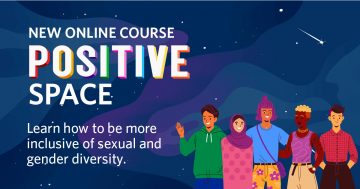
On the 20-year anniversary of Positive Space at UBC, the new Positive Space: Foundations online course is now available to students, faculty, and staff.
The self-guided course, available through the Workplace Learning Ecosystem, provides a low-barrier access for UBC community members to learn about sex, sexuality and gender diversity, and ways to learn about and demonstrate allyship for building a more inclusive UBC.
“The course is designed to help UBC meet its commitments to non-discrimination, embedding a deeper understanding of 2SLGBTQIA+ subjectivities in the broader UBC community” says Kaitlyn Kraatz, Gender Equity Specialist with the UBC Equity & Inclusion Office (EIO) and interim coordinator of the Trans, Two-Spirit, and Gender Diversity Task Force, who contributed to the course development.
Specifically, learners will be better positioned to differentiate between sex, gender, and sexuality, examine how binary understanding of gender works as a tool of colonization, how assumptions, stereotypes and normative frameworks construct everyday life and create barriers to inclusion, and learn terms and labels used by the 2SLGBTQIA+ community.
“As we evolved our understandings of more intersectional and anti-oppression considerations, we updated the curriculum to ensure our UBC community has access to the most up-to-date content,” says Rachael Sullivan, Equity Education Strategist with the EIO, and one of the course designers and educators.
The end goal is that learners become confident with and capable of exercising inclusive practices and supporting behaviour change. This could include pronoun and name use, or exploring how they can improve team belonging, cohesion, and collaboration through additional inclusive practices and processes.
“Often, we have employees or students saying they want be an ally, be more inclusive, but are afraid to make mistakes or are not sure where to turn for information and advice. Some want to be more informed about history and context, or for example, they are not sure what to do if they unintentionally misgender someone – how do they apologize?”
While Positive Space training used to be delivered only through regular in-person workshops, course participants can complete the now asynchronous course on their own time and are encouraged to revisit the course as an on-demand resource. Following the completion of the course, participants are also able to sign up for a complementary synchronous workshop held periodically by staff from the EIO.
“We designed the course to offer a safe, flexible learning mode that accommodates diverse learning styles, answers questions – even awkward ones, and enables participants to take quizzes privately and practice as often needed.”
The course is part of a broader effort to make UBC more inclusive of 2SLGBTQIA+ community and provides a range of benefits to all UBC community members, particularly those seeking to engage in allyship and lateral allyship.
“Participants will be able to take away practices and understandings that they can immediately exercise at the individual level, but also that they can start implementing at a group, club, team or departmental or unit level.”
UBC community members can take the course through the Workplace Learning Ecosystem.